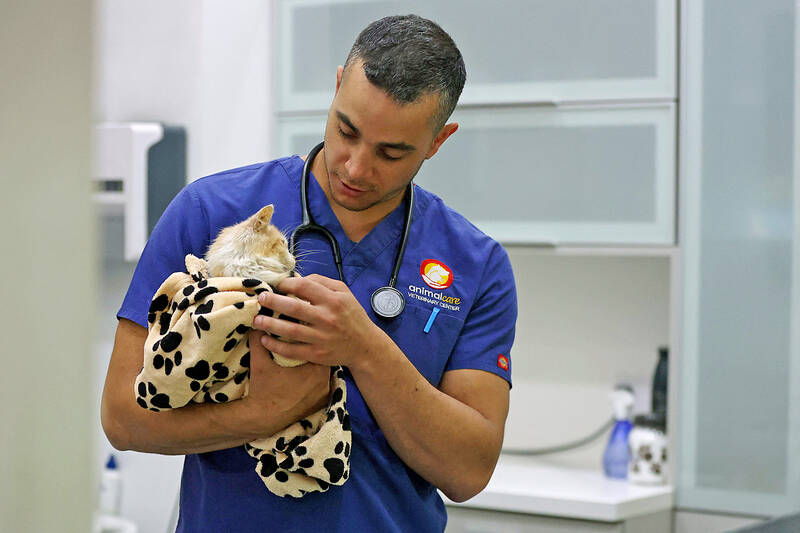A sickly ginger kitten named Bebe is pulled out of a cat carrier at a veterinary clinic in the Cypriot capital, Nicosia.
The six-month-old is suffering from a strain of feline coronavirus that is wreaking havoc on the prolific cat population of Cyprus.
Cats are everywhere on the eastern Mediterranean island, home to the earliest evidence of the animal’s domestication and known by some as the “island of cats.”

Photo: AFP
Many of the island’s felines are strays. They wander at will into people’s gardens, sit expectantly beside restaurant diners in hopes of a tasty morsel and loiter near garbage bins.
Feline infectious peritonitis (FIP), which is not transmittable to humans, has rapidly spread across Cyprus in recent months, being “highly contagious” among cats, veterinarian Kostis Larkou said as he gently examined the visibly disoriented Bebe.
Animal advocates say the number of cats dying from disease is significantly higher than the 107 cases of FIP officially reported by the agriculture ministry in the southern part of the island.
“We have lost 300,000 cats since January” from the virus, said Dinos Ayiomamitis, head of Cats PAWS Cyprus and vice-president of Cyprus Voice for Animals.
Cyprus has been split since a 1974 Turkish invasion in response to a Greek-sponsored coup. The self-proclaimed Turkish Republic of Northern Cyprus, which covers the northern third of the island, is recognised only by Ankara.
But cats on both sides of the UN-patrolled buffer zone are dying from the illness.
Experts say the island’s cat population is equal to or even exceeds the human population of a little more than one million.
In the south, Ayiomamitis estimates that a third of the cats have succumbed to the virus. Cats with FIP have symptoms including fever, abdominal swelling, weakness and sometimes even aggressiveness.
But with so many stray cats, the contagion has proven difficult to diagnose and document.
ANCIENT CAT HISTORY
Cypriots have a long and intertwined history with their furry friends.
Legend has it that a Roman empress, Helena, first brought cats to Cyprus to do away with poisonous snakes about 1,700 years ago.
But archaeological evidence of cats’ domestication on the island dates back further than anywhere else in the world — to 9,500 years ago at the Neolithic village of Shillourokambos, where the remains of a cat and a human were found deliberately buried together.
That bond between feline and human has continued through the millennia, leaving animal lovers like Ayiomamitis taking care of the island’s cats today.
He has fears, though, for the roughly 60 cats he has been feeding at a cemetery in the capital for a quarter of a century.
“The colony is doing well, but we are worried because if one is infected, the others will be too,” says the retiree, 70, as cats scampered up marble tombstones.
Several people who feed stray cats said that many of their regulars are disappearing, and very few corpses are found, noting that when cats are sick, they often self-isolate and die alone.
An outbreak is suspected to be also spreading across cat populations in nearby Lebanon, Israel and Turkey, but in the absence of studies, that cannot be confirmed, said Demetris Epaminondas, vice president of the Pancyprian Veterinary Association.
To contain the spread, two treatment options have been considered. One is molnupiravir, an anti-COVID pill which officials say could not be authorised for use on animals in Cyprus.
Another antiviral tablet, GS-441524, chemically similar to the COVID-19 treatment remdesivir, is approved for animal use in Britain and for importation to Cyprus, with restrictions.
But its cost, at 3,000 to 7,000 euros (about US$3,300-US$7,700) per cat, is prohibitive, and there is no supply in Cyprus.
BLACK MARKET
For weeks, Epaminondas has been trying to obtain government authorization for molnupiravir, which would cost a far more affordable 200 euros per cat.
The agriculture ministry said it was examining all possible means of addressing the issue through “various therapeutic preparations available on the European market.”
Some have resorted to clandestine methods to save their pets.
“We bought our medicines on the black market online, or from Facebook groups. But we keep our suppliers secret so that we can continue to treat our animals,” said one Cypriot, requesting anonymity because of the questionable legality of her actions.
Vasiliki Mani, 38, a member of several animal welfare organizations, is demanding a swift solution.
In January, she spent 3,600 euros to treat two stray cats with FIP.
“I have spent all my savings,” she said, denouncing the cruelty of “allowing animals to die” in Cyprus.
If FIP continues to spread, Mani lamented, Cyprus will become “the island of dead cats.”

On April 26, The Lancet published a letter from two doctors at Taichung-based China Medical University Hospital (CMUH) warning that “Taiwan’s Health Care System is on the Brink of Collapse.” The authors said that “Years of policy inaction and mismanagement of resources have led to the National Health Insurance system operating under unsustainable conditions.” The pushback was immediate. Errors in the paper were quickly identified and publicized, to discredit the authors (the hospital apologized). CNA reported that CMUH said the letter described Taiwan in 2021 as having 62 nurses per 10,000 people, when the correct number was 78 nurses per 10,000

As Donald Trump’s executive order in March led to the shuttering of Voice of America (VOA) — the global broadcaster whose roots date back to the fight against Nazi propaganda — he quickly attracted support from figures not used to aligning themselves with any US administration. Trump had ordered the US Agency for Global Media, the federal agency that funds VOA and other groups promoting independent journalism overseas, to be “eliminated to the maximum extent consistent with applicable law.” The decision suddenly halted programming in 49 languages to more than 425 million people. In Moscow, Margarita Simonyan, the hardline editor-in-chief of the

Six weeks before I embarked on a research mission in Kyoto, I was sitting alone at a bar counter in Melbourne. Next to me, a woman was bragging loudly to a friend: She, too, was heading to Kyoto, I quickly discerned. Except her trip was in four months. And she’d just pulled an all-nighter booking restaurant reservations. As I snooped on the conversation, I broke out in a sweat, panicking because I’d yet to secure a single table. Then I remembered: Eating well in Japan is absolutely not something to lose sleep over. It’s true that the best-known institutions book up faster

The excellent historical novel by Chen Yao-Cheng (陳耀昌) is a gripping tale of Taiwan in the 17th century, called Formosa at the time, told from the perspective of characters representing the three major ethnic groups (the “tribes” mentioned in the title): the indigenous community, the Dutch and the Chinese. Another element that makes this book stand out is the female perspective, as two of the main protagonists are Maria, the daughter of the Dutch missionary Hambroeck, and Uma, an Aboriginal woman with a strong character. The main Chinese character is Chen Ze, a man in charge of a merchant ship